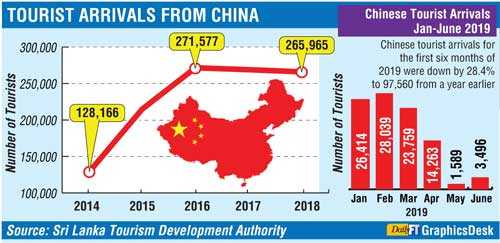Saturday Feb 21, 2026
Saturday Feb 21, 2026
Tuesday, 23 July 2019 00:00 - - {{hitsCtrl.values.hits}}


By Ambassador Cheng Xueyuan
Before being nominated as the Chinese Ambassador to Sri Lanka and arriving at the country to assume my office, I could hardly imagine that there are so many world wonders on this tropical island of over 60,000 square kilometres.
The graceful lake and mountains of Kandy, the quaint and ancient city of Galle, the gorgeous and colourful Colombo, and the breathtaking thrills of Lion Rock are all amazing and stunning. Many Chinese tourists have been attracted to these beautiful sceneries with pleasant surprise like me.
With the strong support and promotion of the Sri Lankan Government as well as the Chinese Embassy in Sri Lanka, the number of Chinese tourists to Sri Lanka has reached nearly 300,000 annually and ranks the top among foreign tourists to Sri Lanka. However, this number is peanuts compared to the number of Chinese tourists attracted by Thailand, which is also a neighbour of China. In 2018, Chinese tourists to Thailand have exceeded 10 million. 
The reasons mainly include following aspects. Firstly is the language barrier. Many Chinese tourists are not accustomed to the English language, much less the Sinhalese or Tamil language. Being accompanied by Chinese-speaking tour guides and interpretation is a must for them. But there are very few Chinese-speaking local guides here and Chinese guides are prohibited from entering Sri Lanka and accompanying with tourists.
Furthermore, Chinese people always have “Chinese stomach” when travelling. They show strong preference to Chinese food. However, it is difficult for a Chinese chef to obtain a working visa to work in or set up a Chinese restaurant. Therefore, the number of Chinese restaurants in Sri Lanka is limited and sometimes cannot meet needs of Chinese tourists.
In addition, a large percentage of Chinese tourists are accustomed to Chinese tobacco and alcohol, which is a reality that the tourism industries in Sri Lanka has to consider seriously, although it is not healthy at all and should not be encouraged. The tourists cannot buy Chinese tobacco and alcohol during their stay and are not allowed to bring a few Chinese cigarettes with them for their personal use when entering this island. Chinese tourists are unaccustomed to these restrictions, since they don’t exist in other countries or at least have some level of exemption or tolerance.
In fact, conveniences, experiences and happiness are precisely what Chinese tourists care about most and these are key factors in their decision-making of travel destinations. I noticed that the Tourism Authority of Thailand emphasised in an interview that the promotion of the Chinese market in 2019 would focus on increasing convenience and happiness, hoping all Chinese friends in Thailand would enjoy a high-quality experience. China is the world’s largest source of tourists with a large number of outbound tourists and has ranked No. 1 in overseas consumption in the world for many years. The size of China’s tourism market is too huge to imagine and compare with many other countries. The growth of related industries such as aviation, hotels, transportation and catering promoted by the tourism industry is also considerable.
At present, Sino-Sri Lanka relations have stepped into a fast development period. The implementation of the Belt and Road Initiative between the two countries is in full swing, the exchanges in various fields are increasingly frequent, and the prospect for Sino-Sri Lanka tourism cooperation is also promising.
I’m fully confident that if Sri Lanka could continuously improve the tourism environment, focus on improving the comfort of foreign tourists as much as Thailand, adjust relevant regulations in accordance with Sri Lankan laws, and ease the existing obstacles for foreign tourists effectively, more and more Chinese tourists will be attracted to Sri Lanka, which will stimulate tourism, consumption and stronger vitality to local economy growth.
The writer is the Ambassador for the People’s Republic of China in Sri Lanka.